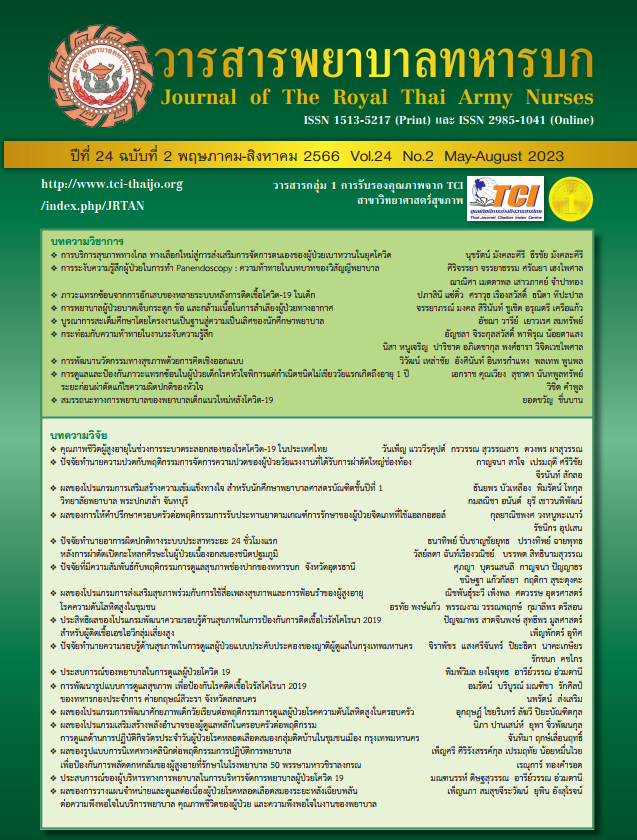Effect of Thengtuk Dance Exercise on the Cognitive Function in the Elderly
Keywords:
Exercise, Dance, Cognitive function, ElderlyAbstract
The purpose of this quasi-experimental research was to examine the effect of Thengtuk dance exercise on the cognitive function in the elderly. A total of 30 participants were recruited using purposive sampling in each of the intervention and control groups. At the end of the study, the intervention group (n = 26) and control group (n = 28) continue in the study. The data collection tools composed of 1) intervention tools including a Thengtuk dance exercise for the elderly video and a guidebook for Thengtuk dance exercise for the elderly and 2) data collection tools including a demographic data questionnaire, The Mental Status Examination Thai, and the two-item depression screening. The data were analyzed using descriptive statistics, chi-square test, dependent t-test, and independent t-test. The results revealed that After participated in Thengtuk dance exercise, the mean difference in the cognitive function score between the intervention group and control group was higher than before statistically significant, but in the control group increased less than the intervention group (p < .001). When considering each component, there were significant differences in the mean score of language comprehension and language expression between the treatment and control group after the intervention (p = .02). There was no significant difference in other component.
Downloads
References
Foundation of Thai Gerontology Research and Development Institute. Situation of the Thai elderly 2016. Bangkok: Foundation of Thai Gerontology Research and Development Institute; 2017. (in Thai).
Aekpalakorn W. (Editor). National Health Examination Survey, NHES I 2014. Nonthaburi: Health Systems Research Institute; 2014. (in Thai).
Bunten, D. Cognitive-perceptual pattern: Normal changes with aging. In M. Mass et al. (Eds.), Nursing care of older adults: Diagnosis, outcomes, & interventions. Mosby 2001; 416-35.
Sanders LMJ, Hortobagyi T, la Bastidevan Gemert S, van der Zee EA, van Heuvelen MJG. Dose-response relationship between exercise and cognitive function in older adults with and without cognitive impairment: A systematic review and meta-analysis. 2019; 14(1):1-24.
Hwang PW, Braun KL. The Effectiveness of Dance Interventions to Improve Older Adults’ Health: A Systematic Literature Review. Alternative therapies in health and medicne. 2015;21(5): 64-70.
Koch SC, Riege RFF, Tisborn K, Biondo J, Martin L, Beelmann A. Effects of Dance Movement Therapy and Dance on Health-Related Psychological Outcomes. A Meta-Analysis Update. Frontiers in psychology. 2019; 20(10):1-28.
The American College of Sports Medicine. ACSM’s Guidelines for Exercise Testing and Prescription. (11th ed.). United States: Wolters Kluwer Health; 2021.
Taylor D. Physical activity is medicine for older adults. Postgraduate medical journal. 2014; 90(1059): 26–32.
Gheysen F, Poppe L, DeSmet A, Swinnen S, Cardon G, De Bourdeaudhuij I, Chastin S, Fias W. Physical activity to improve cognition in older adults: can physical activity programs enriched with cognitive challenges enhance the effects? A systematic review and meta-analysis. International Journal of Behavioral Nutrition and Physical Activity. 2018; 15(1): 1-31.
Blondell SJ, Hammersley-Mather R, Veerman JL. Does physical activity prevent cognitive decline and dementia?: A systematic review and meta-analysis of longitudinal studies. BioMed Central public health. 2014; 14(1): 1-21.
Choombuathong A, Chaitiamwong R, Tothonglor A. Effect of aerobic exercise on reaction time and memory in the elderly. Journal of Health Science. 2015; 24(2): 283-95. (in Thai).
Meng X, Li G, Jia Y, Liu Y, Shang B, Liu P, et al. Effects of dance intervention on global cognition, executive function and memory of older adults: a meta-analysis and systematic review. Aging clinical and experimental research. 2019; 32: 7–19.
Dhami P, Moreno S, DeSouza JF. New framework for rehabilitation - fusion of cognitive and physical rehabilitation: the hope for dancing. Frontiera in paychology. 2015; 5:1-15.
Kim SH, Kim M, Ahn YB, Lim HK, Kang SG, Cho JH, et al. Effect of dance exercise on cognitive function in elderly patients with metabolic syndrome: A pilot study. Journal of Sports Science and Medicine. 2011; 10(4): 671-678.
Sripradit P. Lakon theng tuk in chanthaburi. (thesis). Bagkok: Chulalongkorn University, 2002. (in Thai).
Netz Y. Is there a preferred mode of exercise for cognition enhancement in older age?: A narrative review. Frontiers in medicine. 2019; 6(57): 1-10.
Rabampho P, Boonkerd S, Namphonkrang P, Paikoh K. Effects of the brain training program on cognitive ability among older person at dementia risk group of the elderly home, Nakhon Ratchasima Provincial Administrative Organization. Journal of The Royal Thai Army Nurses, 2021; 22(3): 339-47. (in Thai).
Rongmuang D, Boonprasert N, Pitsawong D, Sangramat D, Ganpai T, Yompakdee T. The satisfaction of thengtuk dance exercise for the elderly, Wang mai sub-district school of the elderly, Na Yai Am district, Chanthaburi province. Journal of Phrachomklao College of Nursing Phetchaburi Province. 2018; 1(2): 1-16. (in Thai).
Siriwat L. Cognition. Bangkok: Odeon Store; 2015. (in Thai).
Boongerd P, editor. Interesting topic about dementia. Dementia Association of Thailand: Newsletter; 2018; 10:1–4. (in Thai).
Hackney ME, Byers C, Butler G, Sweeney M, Rossbach L, Bozzorg A. Adapted Tango Improves Mobility, Motor-Cognitive Function, and Gait but Not Cognition in Older Adults in Independent Living. Journal of the American Geriatrics Society. 2015;63(10): 2105-13.
Merom D, Grunseit A, Eramudugolla R et al (2016) Cognitive benefits of social dancing and walking in old age: the dancing mind randomized controlled trial. Frontiers in aging neuroscience. 2019; 8(26): 1-11.
Hewston P, Kennedy CC, Borhan S, Merom D, Santaguida P, Ioannidis G, Marr S, Santesso N, Thabane L, Bray S, Papaioannou A. Effects of dance on cognitive function in older adults: a systematic review and meta-analysis. Age and ageing. 2021; 50(4): 1084-92.
Downloads
Published
How to Cite
Issue
Section
License
Copyright (c) 2023 Journal of The Royal Thai Army Nurses

This work is licensed under a Creative Commons Attribution-NonCommercial-NoDerivatives 4.0 International License.
บทความหรือข้อคิดเห็นใดใดที่ปรากฏในวารสารพยาบาลทหารบกเป็นวรรณกรรมของผู้เขียน ซึ่งบรรณาธิการหรือสมาคมพยาบาลทหารบก ไม่จำเป็นต้องเห็นด้วย
บทความที่ได้รับการตีพิมพ์เป็นลิขสิทธิ์ของวารสารพยาบาลทหารบก
The ideas and opinions expressed in the Journal of The Royal Thai Army Nurses are those of the authors and not necessarily those
of the editor or Royal Thai Army Nurses Association.






